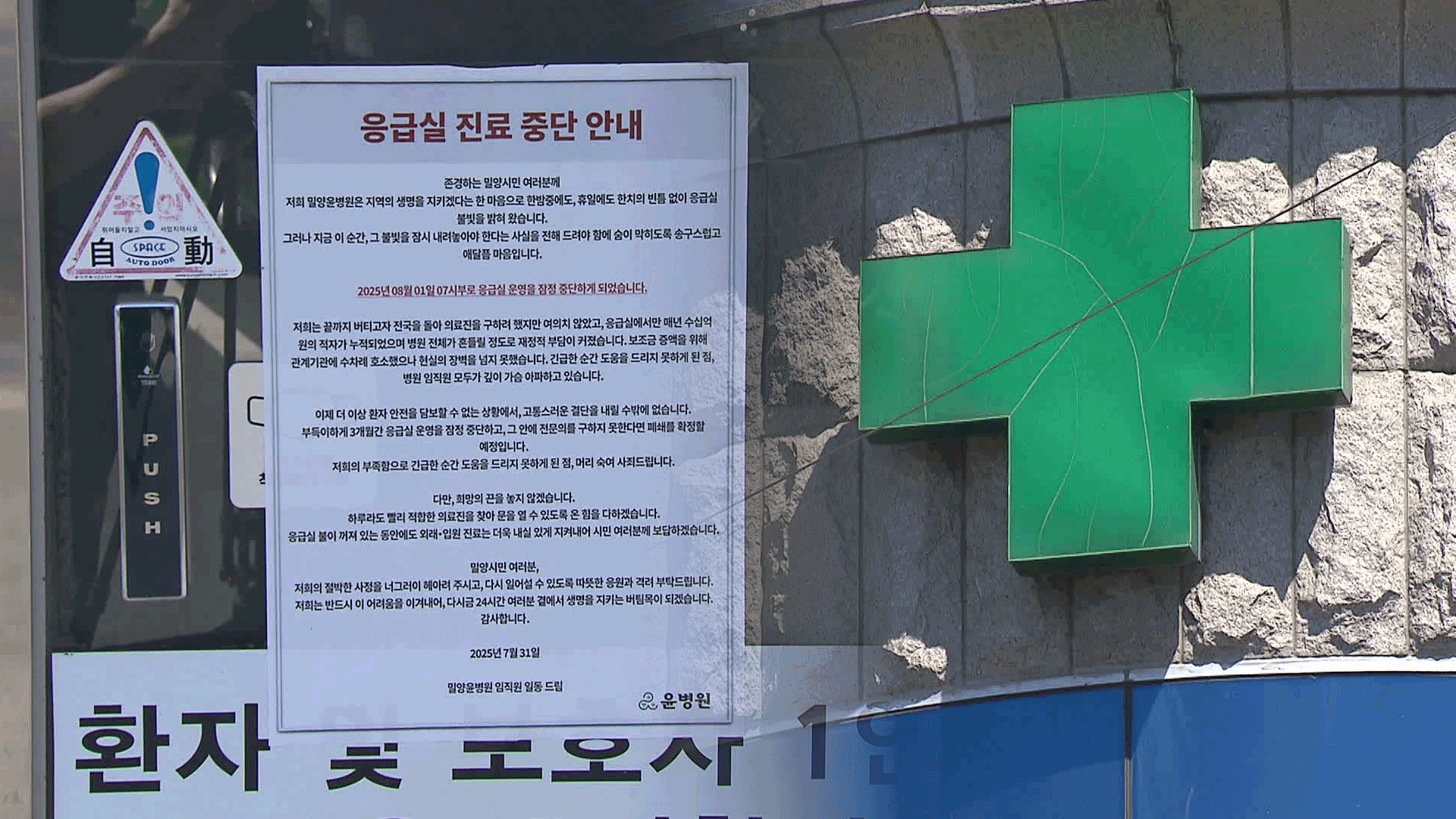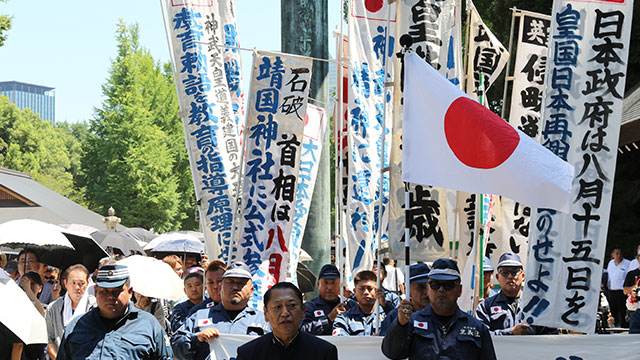[Anchor]
As the large-scale recruitment of new medical residents begins, there is hope that the ongoing medical crisis may soon come to an end—but for small and mid-sized hospitals in regional areas, the situation is worsening.
With many former residents who had been working in regional hospitals now leaving, some hospitals are being forced to close their emergency rooms due to a lack of doctors.
Reporter Jin Sun-min has more.
[Report]
The only 24-hour emergency room in Miryang, South Gyeongsang Province, closed earlier this month.
The reason: three former residents who had been rehired by the hospital quit to apply for the latest round of resident recruitment.
The hospital posted a notice saying it had tried to hold on and find replacement staff, but ultimately couldn’t manage.
[Miryang City Official/Voice Altered: “It's physically impossible for the remaining two doctors to cover 24 hours a day. We ended up voluntarily giving up our designation as a regional emergency medical institution.”]
Other regional hospitals are facing similar struggles.
Around 5,300 former residents who left training hospitals had since been rehired by small and mid-sized hospitals and clinics. Of those, about 2,000 were working in regional areas.
These hospitals, which had relied on the lower-cost labor of former residents, are now facing a critical staffing shortage.
[Choi Anna/Director, Gangneung Medical Center: “More than 10,000 residents are returning to training hospitals all at once. That makes it even harder for us to recruit anyone.”]
[Former Resident/Voice Altered: “This crisis was predictable, yet over the past year and a half, no structural reforms or contingency plans were put in place. Instead, we were simply used as cheap stopgap labor.”]
Medical job boards are now flooded with urgent posts seeking emergency room or on-call doctors, but applicants are scarce.
The shortage is being worsened by the ongoing conflict between the medical community and the government, which has led to the number of newly certified specialists this year dropping to just one-fifth of the usual level.
[Kim Jin-ho/President, Korea Small and Medium Hospital Association: “For the next 5 to 6 years, the number of specialists will remain low. We need measures to redistribute the workload among essential care providers and create an environment where medical staff can continue focusing on essential services.”]
Regional hospitals are now urging the government to temporarily ease staffing requirements and offer support so they can continue operating essential departments like emergency rooms.
This is Jin Sun-min, KBS News.
As the large-scale recruitment of new medical residents begins, there is hope that the ongoing medical crisis may soon come to an end—but for small and mid-sized hospitals in regional areas, the situation is worsening.
With many former residents who had been working in regional hospitals now leaving, some hospitals are being forced to close their emergency rooms due to a lack of doctors.
Reporter Jin Sun-min has more.
[Report]
The only 24-hour emergency room in Miryang, South Gyeongsang Province, closed earlier this month.
The reason: three former residents who had been rehired by the hospital quit to apply for the latest round of resident recruitment.
The hospital posted a notice saying it had tried to hold on and find replacement staff, but ultimately couldn’t manage.
[Miryang City Official/Voice Altered: “It's physically impossible for the remaining two doctors to cover 24 hours a day. We ended up voluntarily giving up our designation as a regional emergency medical institution.”]
Other regional hospitals are facing similar struggles.
Around 5,300 former residents who left training hospitals had since been rehired by small and mid-sized hospitals and clinics. Of those, about 2,000 were working in regional areas.
These hospitals, which had relied on the lower-cost labor of former residents, are now facing a critical staffing shortage.
[Choi Anna/Director, Gangneung Medical Center: “More than 10,000 residents are returning to training hospitals all at once. That makes it even harder for us to recruit anyone.”]
[Former Resident/Voice Altered: “This crisis was predictable, yet over the past year and a half, no structural reforms or contingency plans were put in place. Instead, we were simply used as cheap stopgap labor.”]
Medical job boards are now flooded with urgent posts seeking emergency room or on-call doctors, but applicants are scarce.
The shortage is being worsened by the ongoing conflict between the medical community and the government, which has led to the number of newly certified specialists this year dropping to just one-fifth of the usual level.
[Kim Jin-ho/President, Korea Small and Medium Hospital Association: “For the next 5 to 6 years, the number of specialists will remain low. We need measures to redistribute the workload among essential care providers and create an environment where medical staff can continue focusing on essential services.”]
Regional hospitals are now urging the government to temporarily ease staffing requirements and offer support so they can continue operating essential departments like emergency rooms.
This is Jin Sun-min, KBS News.
■ 제보하기
▷ 카카오톡 : 'KBS제보' 검색, 채널 추가
▷ 전화 : 02-781-1234, 4444
▷ 이메일 : kbs1234@kbs.co.kr
▷ 유튜브, 네이버, 카카오에서도 KBS뉴스를 구독해주세요!
- Resident exodus deepens crisis
-
- 입력 2025-08-15 00:49:46

[Anchor]
As the large-scale recruitment of new medical residents begins, there is hope that the ongoing medical crisis may soon come to an end—but for small and mid-sized hospitals in regional areas, the situation is worsening.
With many former residents who had been working in regional hospitals now leaving, some hospitals are being forced to close their emergency rooms due to a lack of doctors.
Reporter Jin Sun-min has more.
[Report]
The only 24-hour emergency room in Miryang, South Gyeongsang Province, closed earlier this month.
The reason: three former residents who had been rehired by the hospital quit to apply for the latest round of resident recruitment.
The hospital posted a notice saying it had tried to hold on and find replacement staff, but ultimately couldn’t manage.
[Miryang City Official/Voice Altered: “It's physically impossible for the remaining two doctors to cover 24 hours a day. We ended up voluntarily giving up our designation as a regional emergency medical institution.”]
Other regional hospitals are facing similar struggles.
Around 5,300 former residents who left training hospitals had since been rehired by small and mid-sized hospitals and clinics. Of those, about 2,000 were working in regional areas.
These hospitals, which had relied on the lower-cost labor of former residents, are now facing a critical staffing shortage.
[Choi Anna/Director, Gangneung Medical Center: “More than 10,000 residents are returning to training hospitals all at once. That makes it even harder for us to recruit anyone.”]
[Former Resident/Voice Altered: “This crisis was predictable, yet over the past year and a half, no structural reforms or contingency plans were put in place. Instead, we were simply used as cheap stopgap labor.”]
Medical job boards are now flooded with urgent posts seeking emergency room or on-call doctors, but applicants are scarce.
The shortage is being worsened by the ongoing conflict between the medical community and the government, which has led to the number of newly certified specialists this year dropping to just one-fifth of the usual level.
[Kim Jin-ho/President, Korea Small and Medium Hospital Association: “For the next 5 to 6 years, the number of specialists will remain low. We need measures to redistribute the workload among essential care providers and create an environment where medical staff can continue focusing on essential services.”]
Regional hospitals are now urging the government to temporarily ease staffing requirements and offer support so they can continue operating essential departments like emergency rooms.
This is Jin Sun-min, KBS News.
As the large-scale recruitment of new medical residents begins, there is hope that the ongoing medical crisis may soon come to an end—but for small and mid-sized hospitals in regional areas, the situation is worsening.
With many former residents who had been working in regional hospitals now leaving, some hospitals are being forced to close their emergency rooms due to a lack of doctors.
Reporter Jin Sun-min has more.
[Report]
The only 24-hour emergency room in Miryang, South Gyeongsang Province, closed earlier this month.
The reason: three former residents who had been rehired by the hospital quit to apply for the latest round of resident recruitment.
The hospital posted a notice saying it had tried to hold on and find replacement staff, but ultimately couldn’t manage.
[Miryang City Official/Voice Altered: “It's physically impossible for the remaining two doctors to cover 24 hours a day. We ended up voluntarily giving up our designation as a regional emergency medical institution.”]
Other regional hospitals are facing similar struggles.
Around 5,300 former residents who left training hospitals had since been rehired by small and mid-sized hospitals and clinics. Of those, about 2,000 were working in regional areas.
These hospitals, which had relied on the lower-cost labor of former residents, are now facing a critical staffing shortage.
[Choi Anna/Director, Gangneung Medical Center: “More than 10,000 residents are returning to training hospitals all at once. That makes it even harder for us to recruit anyone.”]
[Former Resident/Voice Altered: “This crisis was predictable, yet over the past year and a half, no structural reforms or contingency plans were put in place. Instead, we were simply used as cheap stopgap labor.”]
Medical job boards are now flooded with urgent posts seeking emergency room or on-call doctors, but applicants are scarce.
The shortage is being worsened by the ongoing conflict between the medical community and the government, which has led to the number of newly certified specialists this year dropping to just one-fifth of the usual level.
[Kim Jin-ho/President, Korea Small and Medium Hospital Association: “For the next 5 to 6 years, the number of specialists will remain low. We need measures to redistribute the workload among essential care providers and create an environment where medical staff can continue focusing on essential services.”]
Regional hospitals are now urging the government to temporarily ease staffing requirements and offer support so they can continue operating essential departments like emergency rooms.
This is Jin Sun-min, KBS News.
-
-

진선민 기자 jsm@kbs.co.kr
진선민 기자의 기사 모음
-
이 기사가 좋으셨다면
-
좋아요
0
-
응원해요
0
-
후속 원해요
0















이 기사에 대한 의견을 남겨주세요.